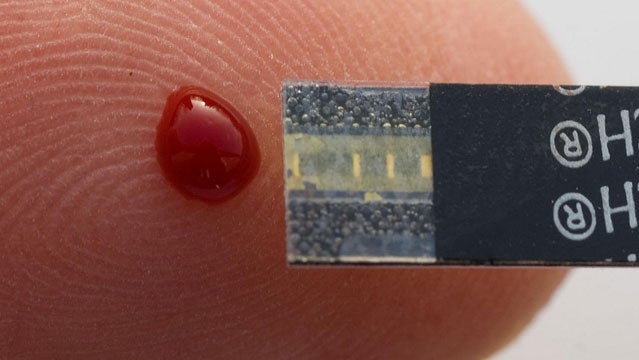“I’m trying to help you optimize yourself to live longer,” says Gil Blander, founder of , a Cambridge, Massachusetts, company that uses lab work to analyze athletes’ nutritional blind spots. Send him $299 and a few vials of blood, the Israel-born biologist says, and he can show you how to enhance your performance, raise your metabolism, reduce pain, improve sleep, boost energy, and optimize mood. It might sound like a slick sales pitch, but Blander is on the forefront of what could be the next great leap in health and fitness. InsideTracker is one of at least a dozen startups that have appeared in the past few years, including and , hoping to bring blood-based analytics into the mainstream.
31ml
Amount of your blood InsideTracker requires to analyze 20 biomarkers.The science they’re marketing is sound. In the past five years, thanks to new research and advancements in analysis equipment, the medical field has experienced a breakthrough in its ability to identify and test the levels of thousands of blood-based indicators like cholesterol, calcium, and vitamin D. Medical labs can now examine about 3,000 of these biomarkers, which doctors then use to predict everything from heart failure to cancer. But not all doctors use the tests—often, they call for them only if there are other signs of trouble. As blood-analysis technology has improved and become cheaper, private companies have started customizing programs for consumers who want to know more about their health than their insurance plans are willing to pay for. Most of these companies cater to patients looking to assess their risk for diseases like breast cancer and ALS, but more recently, companies like InsideTracker have been targeting athletes hoping to improve their fitness through nutrition tips derived from blood-based analysis.
“Even a few years ago, the technology wasn’t there to do this,” says Chris Talley, an aerospace physiologist and founder of Precision Food Works, a testing-based nutrition company in El Segundo, California, that works with both amateur and professional athletes, including Giants pitcher Barry Zito and YouTube biking star Danny MacAskill. “Now it’s evolved to a place where there’s some solid science behind it and very actionable information.”
Here’s how it works: You pick which biomarkers you want analyzed, either from an online menu like InsideTracker’s or during a consultation with someone like Talley. You get your blood drawn in a lab or do it yourself, then send it to a diagnostic center. In a few days you’ll receive detailed information about your health—everything from muscle inflammation and damage to vitamin deficiencies and high cholesterol.
What happens next depends on who analyzes your data and how much you’re willing to pay. Talley, who charges about $1,000 for a comprehensive blood panel, will sit with you for two hours to explain why certain biomarkers may be high or low, how your performance might be affected, and what to do about it. InsideTracker is less personalized. It posts your results online, and the program makes nutritional recommendations to help you address any deficiencies or high marks. The advice you get is likely to differ from company to company. Both InsideTracker and make their recommendations using proprietary formulas that establish normal ranges for each biomarker. InsideTracker developed its ranges, which vary depending on age, gender, and activity level, from a database of more than 100,000 healthy people. Talley bases his on decades of personal experience working with professional athletes.
According to Blander, it’s these specially developed parameters that make paying for private analytics worth the steep fees. You might get the same test results from your family doctor, but the advice offered will probably be based on generic ranges that are applied to young and old alike. For example, according to guidelines from the National Institutes of Health, ferritin, an indicator of the amount of iron in your blood, should be within 12 to 150 nanograms per milliliter in females. If your levels are in that range, your doctor might not even bring it up. Blander, however, says that because iron plays a key role in how the body uses fuel, a dip below 40 in athletic women could have a big impact on performance.
Another biomarker of particular interest to athletes is creatine kinase. “There’s a strong correlation between a high level of it in your blood and cramping and muscle injuries,” Blander says. But doctors often test for creatine kinase only when patients show symptoms of a heart attack, not when they’re trying to tweak performance.
These kinds of game-changing insights have already led to the widespread adoption of blood analysis in the professional ranks. Pros who do it, claims Talley, may not feel as if their world has changed, but they will notice improvements. He points to Jonathan Toker, an elite triathlete and runner, who underwent testing with Talley in May 2011 and found out he was allergic to lactose. He was also low in omega-3 fatty acids, thought to help reduce inflammation and regulate hormones. Talley recommended that he cut dairy from his diet two weeks before a race and take fish- and flaxseed-oil supplements. Toker can’t point to a specific change in his overall performance but says he felt a real boost to his general health and ability to recover. “I’m digesting food better,” he says, “and I definitely notice I’m healing quicker.”
So can personalized data give amateurs a competitive edge? If you’re the type of person already paying for coaching or tracking your diet along with your workout schedule, then blood analysis is a logical next step. In fact, while the technology is still in its infancy, many personal coaches and nutritionists are already recommending analysis for their clients. “We test our VO2 max, and we test our metabolism,” says Lauren Antonucci, a Manhattan sports dietitian who consults for the New York Road Runners. “This is one more tool in our box, and it will help us know if we’re eating enough antioxidant-rich fruits and vegetables.”
As the technology improves, expect getting blood drawn to become a much easier sell as well. While InsideTracker and Precision Food Works require at least one vial of blood to do their analysis, most experts believe that within a few years you’ll be able to test your blood with a one-inch disposable chip that works with a single drop. In that case, there will be enough information gleaned from a pinprick to change your life, not just your performance on the bike. “Five years from now,” says Talley, “it’ll almost be malpractice to prescribe medicine without genetic and nutritional analysis.”


